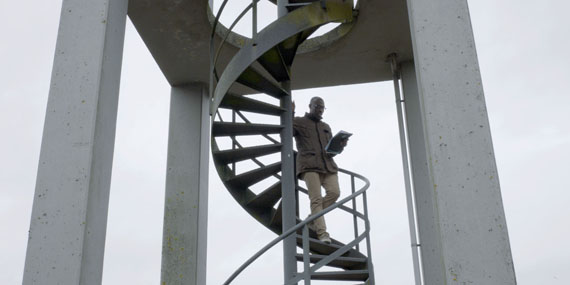
Wendelien van Oldenborgh »
Cinema Olanda
Exhibition: 13 May – 26 Nov 2017
Cinema Olanda is a collaborative project by artist Wendelien van Oldenborgh and curator Lucy Cotter for the Dutch Pavilion at the Venice Biennale 2017. It embraces national representation as an opportunity to reflect on the Netherlands’ (inter)national image in relation to the current rapid transformations in Dutch society. The exhibition takes as its conceptual departure point Gerrit Rietveld’s Dutch Pavilion (1953). Van Oldenborgh has created a major new (filmic) installation engaging with the architectural and social vision of the Netherlands inherent in the pavilion and its resonance in lived reality today.
Designed during the Postwar Reconstruction, when architecture was key to forging a new national image, the pavilion projects a progressive image of openness and transparency. Van Oldenborgh’s installation enters into dialogue with Rietveld’s architecture, highlighting its aesthetics yet creating tension with its underlying order. It houses her three new "films" in which architecture offers a departure point for individuals from different generations to address recent events and postwar developments from personal and professional perspectives. The films convey an alternative narrative to the Netherlands' self-image as a tolerant nation, revealing a complex and rapidly transforming social, cultural and political space, both in the '50s and today.
The title film, Cinema Olanda (2017), marks a bold new filmic step in the artist’s oeuvre by being shot in one uncut take in an attempt to connect an urban district in Rotterdam, several alternative voices behind Dutch postwar society, and current events in a momentary filmic reality. References range from revolutionary intellectual Otto Huiswoud to urban planner Lotte-Stam Beese. Prologue: Squat/Anti-Squat (2016), a two-part film, engages with architect Aldo van Eyck’s recently squatted Tripolis building in Amsterdam and a 1970’s Dutch-Caribbean squatting action, evoking transforming conceptions of solidarity. Footnotes to Cinema Olanda #1 and #3 (2017), large-scale lenticular images of the title film’s production, offer a condensed filmic experience, activating the viewer’s body in space.
Oldenborgh’s and Cotter’s collaborative project extends beyond the Dutch pavilion to bring "home" the exhibition’s underlying questions about social imaginaries and their agency to a national audience. A multidisciplinary parallel program will take place at leading Dutch institutions: Witte de With Center for Contemporary Art, Rotterdam (June 17–August 20), EYE Film museum (June 13), and the Stedelijk Museum (June 30) in Amsterdam. An additional live event will take place in the pavilion on June 23 with contributions by Avery Gordon, Sarat Maharaj and Gloria Wekker.
Wendelien van Oldenborgh (Rotterdam, 1962) is acclaimed for her multi-layered films that grapple creatively with urgent cultural and political questions and their relationship to historic legacies. Widely exhibited in museums and biennials internationally, recent solo exhibitions include .As for the Future. at DAAD gallery, Berlin (2017) and From Left to Night at The Showroom, London (2015).
Lucy Cotter (Ireland, 1973) is an independent curator and writer engaging with art’s relationship to the unknown, to aesthetics and to politics. Her books include Reclaiming Artistic Research, ed. (forthcoming 2017) and Art Knowledge: Between the Known and the Unknown (forthcoming). Major curatorial projects include Here as the Centre of the World (2006–08), held in six cities worldwide.�